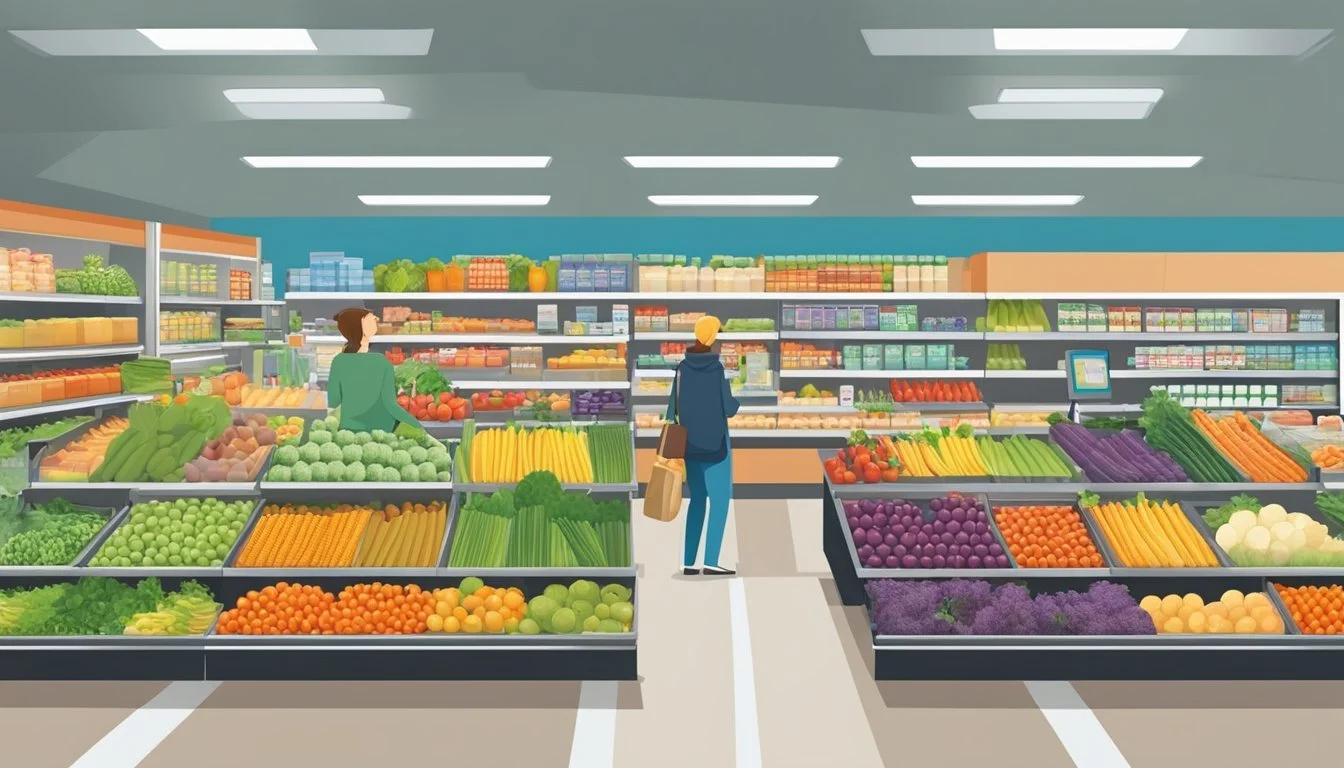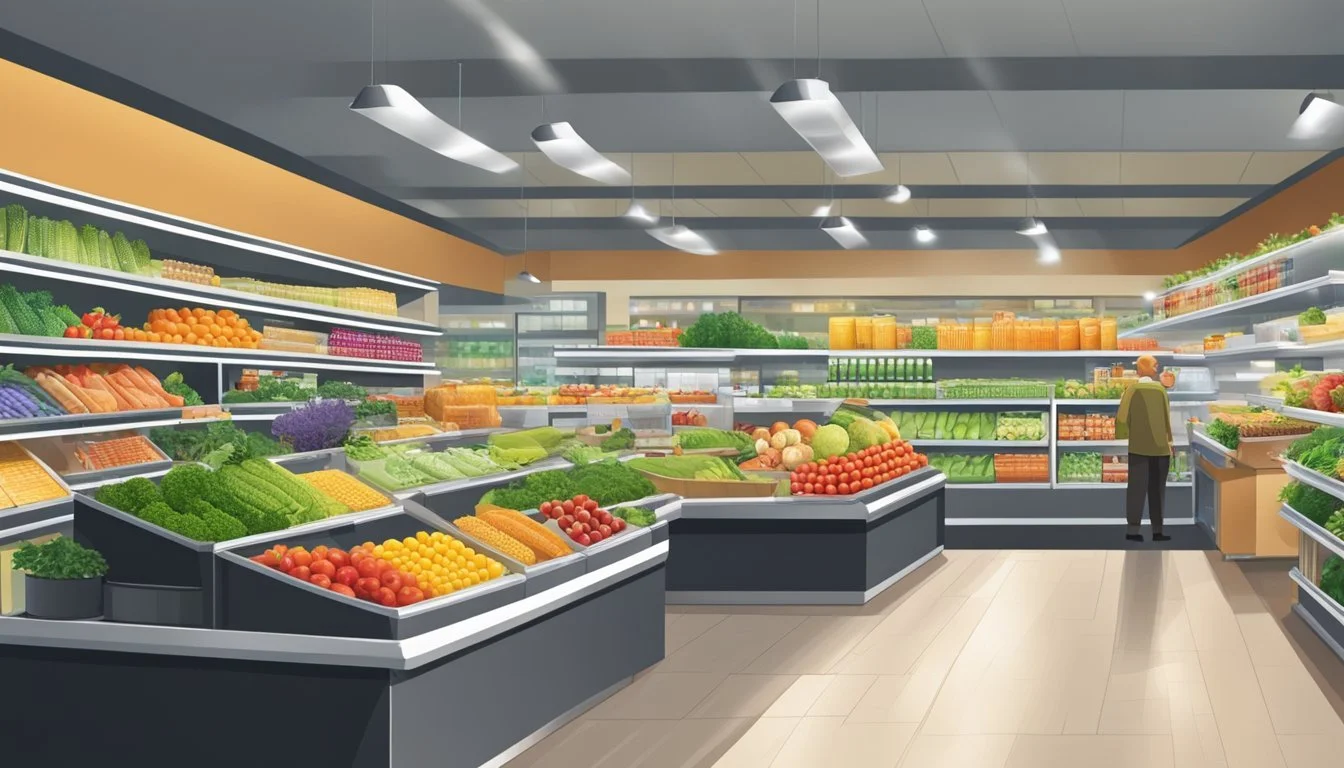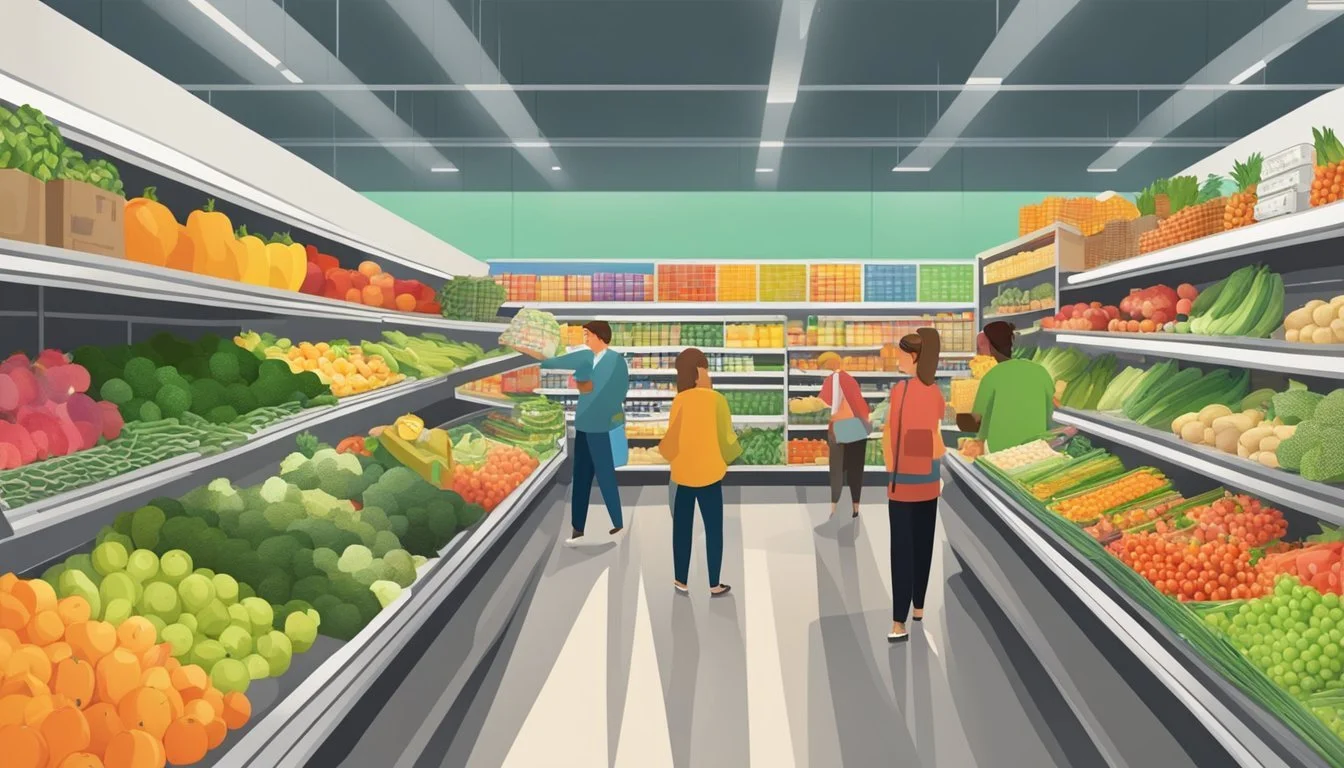Kroger vs Raley's
A Comprehensive Comparison of Prices, Quality, and Selection
Grocery shopping can be a significant part of a household's budget and routine. Two popular supermarket chains, Kroger and Raley's, offer distinct experiences for shoppers across the United States. While both stores aim to provide quality products and services, they have unique strengths and weaknesses that set them apart.
Kroger generally offers better overall value, with competitive pricing and a wide selection of products, while Raley's focuses more on customer service and a local shopping experience. Kroger, as the largest U.S. supermarket chain, has leveraged its size to provide affordable options, including organic produce. Raley's, with its roots as a family-owned business, has built a reputation for personalized service and community engagement.
When choosing between Kroger and Raley's, shoppers must consider factors such as price, product variety, store atmosphere, and customer service. Each chain caters to different preferences, making the "better" option a matter of individual needs and priorities.
Company Overviews
Kroger and Raley's are two prominent grocery chains with distinct histories and regional presences. Both have expanded over the decades to serve millions of customers across multiple states.
Kroger's History and Expansion
Kroger was founded in 1883 by Barney Kroger in Cincinnati, Ohio. The company grew rapidly through acquisitions and organic expansion. Today, Kroger operates over 2,700 stores across 35 states under various banners. These include Kroger, Ralphs, Dillons, Smith's, and Fred Meyer.
Kroger is now the largest supermarket chain in the United States by revenue. The company employs over 450,000 people and generates annual sales exceeding $130 billion. Kroger has embraced technology, investing heavily in e-commerce and digital initiatives to enhance the shopping experience.
Raley's Origins and Growth
Thomas P. Raley founded Raley's in 1935 with a single store in Placerville, California. The family-owned company expanded gradually throughout Northern California and Nevada. Raley's now operates 126 stores under several brands:
78 Raley's supermarkets
20 Nob Hill Foods locations
5 Food Source stores
1 Sak N' Save
Raley's is headquartered in West Sacramento, California. The company remains privately held, with Michael Teel, grandson of the founder, serving as owner and chairman. In recent years, Raley's has introduced the Raley's O-N-E Market concept, focusing on organic, nutrition, and education.
Product Range and Quality
Kroger and Raley's offer diverse product selections with varying strengths in different departments. Both chains prioritize quality but differ in their focus areas and sourcing practices.
Produce and Organic Offerings
Kroger maintains a wide selection of fruits and vegetables, including a growing organic section. Their Simple Truth organic brand provides affordable options across multiple categories. Raley's emphasizes locally sourced produce when possible, partnering with regional farmers.
Raley's organic produce section tends to be more extensive, featuring a broader range of specialty and seasonal items. Both stores offer pre-cut fruit and vegetable options for convenience.
Meat and Seafood Selection
Kroger's meat department provides a mix of conventional and organic options. Their seafood counter includes both fresh and frozen selections. Raley's is known for its high-quality meat selection, often featuring locally raised beef and poultry.
Raley's seafood department typically offers a wider variety of fresh fish and shellfish. Both chains have butchers on-site for custom cuts and special orders.
Bakery and Deli Options
Kroger's bakery department produces a range of fresh breads, cakes, and pastries daily. Their deli offers pre-packaged and made-to-order sandwiches, along with hot food bars in some locations.
Raley's bakery is often praised for its artisanal bread selection and custom cake options. Their deli features a variety of gourmet cheeses and prepared meals, catering to busy shoppers seeking quality convenience foods.
Dairy and Dry Goods
Kroger stocks a comprehensive selection of dairy products, including their own private label options. Their dry goods aisles cover a wide range of national brands and budget-friendly store brand alternatives.
Raley's dairy section often includes more specialty and local items, such as artisanal cheeses and small-batch yogurts. Their dry goods selection, while smaller than Kroger's, tends to focus on higher-quality and natural products.
Pricing and Value
Kroger and Raley's employ different pricing strategies and value propositions to attract customers. Both chains offer competitive pricing on everyday items, loyalty programs, and special discounts to provide value.
Everyday Prices and Deals
Kroger aims to keep prices low on staple items through its "Low Price Lockdown" program. This initiative maintains consistent low prices on hundreds of popular products. Raley's takes a slightly different approach, focusing on quality and freshness while still offering competitive prices on essentials.
Both stores run weekly sales and promotions. Kroger often features "10 for $10" deals on select items. Raley's "Big Book of Savings" highlights monthly specials and multiday sales events.
Discounts and Loyalty Programs
Kroger's loyalty program, Kroger Plus, offers personalized digital coupons and fuel points. Members can save up to $0.55 per gallon at Kroger fuel centers. The program also provides exclusive member-only pricing on select items.
Raley's Something Extra rewards program gives members 1 point for every $1 spent. Points can be redeemed for discounts on future purchases. The program includes personalized offers based on shopping history.
Cost Comparison with Competitors
When compared to major competitors like Walmart and Target, Kroger generally offers lower prices on groceries. However, Walmart often beats Kroger on non-food items. Raley's prices tend to be higher than discount chains but competitive with other regional supermarkets.
Kroger's private label brands, such as Simple Truth and Private Selection, offer savings compared to national brands. Raley's own Raley's, Nob Hill, and Sunnyside Farms brands provide similar value options.
Both chains struggle to match the low prices of discount grocers like Grocery Outlet and WinCo. However, they typically offer a wider selection and higher-quality produce than these budget competitors.
Shopping Experience
Kroger and Raley's offer distinct shopping experiences, each with its own strengths in store design, customer service, and community involvement. These aspects significantly impact how customers perceive and interact with the grocery chains.
Store Layout and Design
Kroger stores typically feature a spacious layout with wide aisles and clear signage. The chain emphasizes efficiency, with departments arranged logically to facilitate quick shopping trips. Many Kroger locations have modernized their interiors, incorporating brighter lighting and updated color schemes.
Raley's, on the other hand, focuses on creating a more upscale ambiance. Their stores often have a warmer, more inviting atmosphere with wood accents and softer lighting. Raley's flagship store in Land Park showcases this approach, offering a curated shopping experience with specialized departments and gourmet offerings.
Both chains prioritize cleanliness and organization, but Raley's tends to have a slight edge in presentation and visual appeal.
Customer Service and Checkout Efficiency
Kroger has invested heavily in technology to improve checkout efficiency. Many stores offer self-checkout options and mobile payment solutions to reduce wait times. The chain also employs a large workforce, ensuring adequate staffing during peak hours.
Raley's prides itself on personalized service. Their employees often receive extensive product knowledge training, allowing them to provide informed recommendations to customers. Checkout lines at Raley's can sometimes be longer due to fewer self-service options, but the interaction is generally more personal.
Both chains have implemented loyalty programs to enhance the customer experience and offer personalized deals.
Community Engagement and Brand Image
Raley's has deep roots in the communities it serves, particularly in Northern California and Nevada. The company frequently partners with local suppliers and sponsors community events. This approach has fostered strong brand loyalty among area consumers.
Kroger, as a larger national chain, takes a broader approach to community engagement. The company runs significant nationwide charitable initiatives, such as its Zero Hunger | Zero Waste program. While this creates a positive brand image, it may feel less personalized to local communities.
Both chains actively work to position themselves as socially responsible businesses, but Raley's local focus often resonates more strongly with its customer base.
Additional Services
Kroger and Raley's offer a range of services beyond basic grocery shopping to enhance customer convenience and experience. These include delivery options, pharmacy services, and specialized departments.
Grocery Delivery and Pickup
Kroger provides extensive delivery and pickup services through its Kroger Delivery program. Customers can order groceries online or via the Kroger app for home delivery or curbside pickup. Same-day delivery is available in many areas.
Raley's offers eCart, its online ordering system for pickup and delivery. Customers can schedule pickup times or have groceries delivered to their homes. Raley's also partners with Instacart in some locations for additional delivery options.
Both stores have user-friendly websites and mobile apps for easy ordering. Fees and minimum purchase requirements may vary by location and service type.
Pharmacy and Health Options
Kroger operates in-store pharmacies at most locations. Services include prescription filling, immunizations, and health screenings. Many Kroger pharmacies offer drive-thru pickup for added convenience.
Raley's provides pharmacy services at select stores. Their pharmacies offer prescription medications, vaccinations, and medication therapy management. Some Raley's locations feature wellness centers with expanded health services.
Both chains typically accept most major insurance plans and offer generic drug programs to help customers save money on prescriptions.
Specialty Departments and Services
Kroger stores often include specialty departments such as bakeries, delis, and floral sections. Many locations offer prepared foods, including hot meal options and salad bars. Some Kroger stores have Starbucks cafes or fuel centers.
Raley's features similar specialty departments in many stores. Their deli sections often include made-to-order sandwiches and prepared meals. Some Raley's locations have expanded offerings like sushi bars or wine tasting areas.
Both chains provide catering services for events and gatherings. Gift card programs and loyalty rewards are available at Kroger and Raley's, allowing customers to earn points or discounts on future purchases.
Sustainability and Social Responsibility
Kroger and Raley's have implemented various initiatives to address environmental concerns and support their local communities. Both companies prioritize sustainability and social responsibility as key aspects of their business practices.
Environmental Initiatives
Kroger has set ambitious goals to reduce its environmental impact. The company aims to achieve zero waste to landfills by 2025 and decrease its carbon emissions by 30% by 2030. Kroger has also committed to sourcing 100% sustainable palm oil for its private label products.
Raley's focuses on reducing food waste through its Food for Families program. The company donates unsold, edible food to local food banks and composts inedible organic waste. Raley's has also installed energy-efficient lighting and refrigeration systems in its stores to reduce electricity consumption.
Both retailers offer a wide selection of organic products and promote sustainable packaging options. Kroger has pledged to make 100% of its private label packaging recyclable, reusable, or compostable by 2030.
Community Support and Local Partnerships
Kroger's Zero Hunger | Zero Waste initiative aims to end hunger in communities and eliminate food waste across the company by 2025. The program has provided over 640 million meals to people facing hunger since its inception.
Raley's works closely with local farmers and producers to source fresh, locally-grown produce. The company's "Farm to Fork" program highlights regional products and supports small-scale agriculture in the communities it serves.
Both retailers actively engage in charitable giving. Kroger donated $301 million to hunger relief organizations in 2020. Raley's Food for Families program has raised over $42 million since 1986 to support local food banks and families in need.
Kroger and Raley's also offer volunteer opportunities for employees to give back to their communities through various charitable events and initiatives.
Consumer and Expert Opinions
Independent ratings, surveys, and research provide valuable insights into how Kroger and Raley's compare. Both chains have their strengths and weaknesses according to shoppers and industry analysts.
Ratings and Reviews
Kroger typically receives average to above-average ratings from consumers. Many shoppers praise Kroger's wide selection and competitive prices. The chain's private label products are often highlighted as good value. Customer service experiences vary by location.
Raley's tends to score higher in customer satisfaction surveys. Shoppers frequently commend Raley's for its clean stores, high-quality produce, and friendly staff. The chain's focus on organic and local products is viewed positively by many consumers.
Consumer Reports rankings place Raley's above Kroger overall. Raley's earns particularly strong marks for store cleanliness and produce quality. Kroger scores well for competitive pricing but receives lower ratings for customer service and checkout speed.
Surveys and Research Findings
Industry surveys show Kroger outperforming Raley's in terms of market share and sales volume. Kroger's larger footprint and lower prices appeal to budget-conscious shoppers.
Research firms note Raley's strength in customer loyalty among its core shoppers. The chain's emphasis on fresh, high-quality products resonates with health-conscious consumers.
Studies on common grocery items reveal:
Kroger offers lower prices on national brands
Raley's provides better deals on organic produce
Both chains receive similar ratings for meat quality
Researchers find Kroger excels in digital integration and e-commerce capabilities. Raley's earns praise for its community involvement and sustainability initiatives.
Company Direction and Innovations
Kroger and Raley's are pursuing innovative strategies to enhance the shopping experience and expand their market presence. Both companies are investing in technology and exploring new store concepts to meet evolving consumer needs.
Technological Advancements in Shopping
Kroger has embraced digital innovation, attracting 4 million daily digital visits. The company's retail media network capitalizes on 11 million daily store visits, offering unique opportunities for CPG brands. Kroger's digital platforms provide personalized deals and convenient online ordering options.
Raley's focuses on technology that supports its health-focused mission. The company has implemented shelf-labeling systems to highlight nutritious options and developed mobile apps for easy meal planning. Raley's also offers online ordering and curbside pickup services to cater to time-pressed customers.
Expansion Plans and Market Trends
Kroger continues to grow through strategic acquisitions and partnerships. The company's merger with Albertsons aims to strengthen its position against competitors like Walmart and Amazon. Kroger is also expanding its Ocado-powered automated fulfillment centers to improve online order efficiency.
Raley's pursues purpose-driven growth, exemplified by its acquisition of Bashas' Family of Stores in 2021. The company is expanding its O-N-E Market concept, which focuses on organic, nutrition-education, and environmentally friendly products. This aligns with Raley's mission of "Helping Change the Way the World Eats One Plate at a Time."
Conclusion
Kroger and Raley's each have distinctive strengths as grocery stores. Kroger shines with its competitive pricing and wide selection of products. The chain offers good value, especially on organic produce.
Raley's focuses more on quality and customer service. It provides a pleasant shopping experience with attentive staff. The store emphasizes fresh, local products when possible.
For budget-conscious shoppers, Kroger likely has the edge. Its larger scale allows for lower prices on many items. Those prioritizing organic options may also prefer Kroger's offerings.
Customers seeking a more personalized experience may gravitate towards Raley's. The regional chain cultivates stronger community ties in its markets.
Ultimately, the better choice depends on individual priorities. Price-sensitive consumers may favor Kroger. Those valuing ambiance and service could prefer Raley's. Both stores aim to meet shoppers' grocery needs, just with different approaches.








